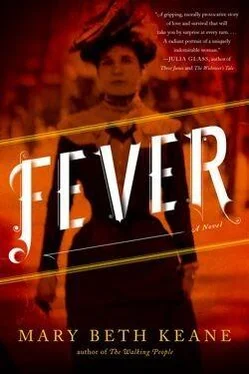It was useless to ask Alfred himself, because according to him he never drank more than he could handle, and when Mary was gone he never drank at all; he only worked or tried to get work. The longest she’d been gone without returning home was three months, but even on the jobs where she was close enough to get home for the odd Sunday, one day was not enough to see what was happening. Who helped him up the stairs when he called and called but never got any answer? Not Mr. Hallenan, who hated both Alfred and Mary. Not Jimmy Tiernan, who wouldn’t be allowed out. Maybe he got up the stairs himself. Or maybe he slept wherever he landed. Or maybe he told the truth, that when Mary was gone he didn’t drink at all. Maybe that behavior was something he saved for her, a punishment, perhaps, for always leaving.
• • •
In some of the homes where Mary had worked, the families had pots and pans by the dozen, sinks with two chambers, iceboxes that could keep a hock of ham frozen for a whole summer. In the rooms she and Alfred shared, they had one skillet, one tall stockpot for boiling, and one small saucepan. But those three vessels were enough for two, enough for the sort of meals Alfred liked most.
That evening, in case he would return, Mary walked downtown from Nation’s door and then east, to the butcher on Second Avenue that stayed open until six. When she finally got there and smelled the raw meat combined with the sawdust on the floor and the fresh herbs on the counter for those who liked to take home their cuts already seasoned, she knew that he would come home.
Back in her own silent kitchen, she cleared off the cluttered table and used it to prep. She filled the pot with water. She rubbed the small pork tenderloin she’d purchased half-price with plenty of salt and pepper, a bit of nutmeg she grated, a pinch of cinnamon, a dash of sugar, a teaspoon’s worth of onion powder she measured with her cupped hand.
After a while, she heard noise on the stairs, steps on the fifth-floor landing. She opened the door and waited.
“Mary,” he said, and stopped climbing two steps from the top. He clutched the railing.
“Are you all right?” she asked. Not seeing him for a long time and then seeing him again was a famine and a feast her body knew the rhythms of better than her mind. The light was dim, and Alfred, with his dark hair and eyes, his dark clothes, threatened to fade into the paneling, the deep wines and forest greens of the cheap wallpaper the building’s owner had pasted up so many years ago. Mary couldn’t stop herself from walking over to him. She couldn’t stop herself from holding out her hand. He was every bit as handsome as he’d been when she was seventeen and he twenty-two. He was every bit as strong.
“I’m all right,” he said, taking her hand between his and drawing it closer for a kiss.
“I made supper,” she said to him, tugging him gently up the last two steps until he was standing in front of her.
He put his hands on either side of her head and then cupped her face. He clutched her shoulders and pulled her to his chest.
“Thank you, Mary. I’m very glad.”
• • •
Things stayed good between them for two weeks, and then like a balloon with the tiniest puncture, they started to sink. He came home later. He wouldn’t touch what she cooked. Instead of talking with her in the mornings, he rolled over and stared at the wall until she left to spend the day cooking down at a firehouse social, or a church hall, or a company picnic, or one of the other day jobs she’d arranged by grasping at connections, following up on every rumor, showing up at doors with her knives folded neatly in her bag to say that she heard there was need of a cook.
September, October, November: they moved around their rooms keeping furniture between them. Once, just before Christmas, they’d been about to pass each other on the stairs when Mr. Hallenan stepped out on the landing and said the missus had kicked him out. Alfred and Mary had looked immediately to each other and laughed, she facing up the stairs, he facing down. They’d laughed together at Mr. Hallenan’s expense, and for one instant they stepped outside of that particular moment in time.
Sometimes, very late at night, he told her he knew that all the cruel things she said to him were the truth, and it was easy to talk to him then, to pile on more and more because in those moods he would just accept it, tell her she was right, absolutely right. But during the day, whenever she caught him sober, and worked up the courage and energy to face this thing that was eating away at them, she’d take a breath to speak and before she uttered one single syllable he’d already be cringing, closing his eyes, looking away, bracing himself for the volley that would follow, and it was that cringe, before she’d even said a word, like she wasn’t even allowed to speak, like she wasn’t even allowed to raise the slightest objection to the way he was living his life, the way he winced before she’d even fully turned from the counter, that had driven her to the office to find a situation that would keep her away from him. She told Mr. Haskell, who ran the agency, that a regular day off to come home didn’t matter to her. She was willing to go as far as Connecticut. She’d go up to Tuxedo if they paid her enough, and gave her a private room.
“There is one family that just got in touch yesterday,” Mr. Haskell said as he went through her file. “Bowen is their name.” He looked up to gauge whether the name rang a bell. “There are cooks in front of you, but you have Priority in Placement.” Priority in Placement was a phrase she’d seen on her employment file and scribbled on the envelope where her employers gave the agency honest reviews of her work, her person, how she fit with the family, how open she was to suggestion, how she got on with the other staff. That she had this designation made her lucky, Mr. Haskell wanted her to understand, but she still had to be careful. The Warrens might take that same house in Oyster Bay next summer, and the summer after. Did Mary know how many cooks in New York City would love to spend the summer in Oyster Bay? Did Mary know that President Roosevelt had a home there?
How could Mary not know it? Every head in town was swiveled toward the ugly brown mansion. Mary gathered that not all of the Warrens’ guests had voted for the man, but by God were they happy to be eating and sleeping and swimming so near.
“There was sickness in the Warren family over the summer,” Mr. Haskell said after reading the letter Mary had carried for him all the way from Oyster Bay. “Typhoid. You didn’t get it?”
“No.”
“Ever had it?”
“No.”
“And you stayed on to help nurse those who got it.” He glanced at the letter again as if to double-check what was written there.
“What else could I do? I’ve been near it before and never got it. I helped nurse the Draytons. Remember the Draytons?”
Mr. Haskell frowned, and Mary felt a clutch of panic. Had she gotten the Drayton job through the agency? She couldn’t remember.
“I’m sure the Warrens appreciated it very much.” Mr. Haskell leaned back in his chair. “Did they give you a bonus?”
“They kept paying me the wage we’d agreed on for August, so I got three additional weeks.”
“And no more?”
“No more.”
The more was given in cash and had been deposited in her bank account weeks earlier.
Mr. Haskell regarded her for a moment. “Report to the Bowen residence by noon on Monday,” he said.
Someone had propped open the doors and the ceiling fans were humming, but none of it made a bit of difference in the sweltering courtroom. Mary heard the creak of Alfred’s chair behind her, and was about to turn when Mr. O’Neill scribbled a word onto his pad and pushed it toward her: “Soper.” She looked up to find the guard crossing the room toward him, and one of the other lawyers announcing his full name. “Do not react,” Mr. O’Neill had warned her during their preparations. “Show that you are paying attention, but be respectful.” Soper stood from his chair as neatly and silently as a paper removed from an envelope and unfolded along the seams.
Читать дальше












